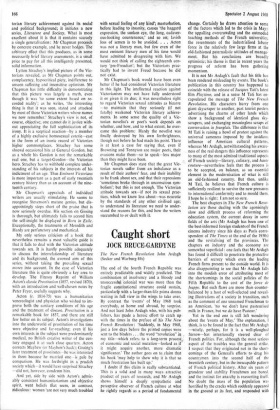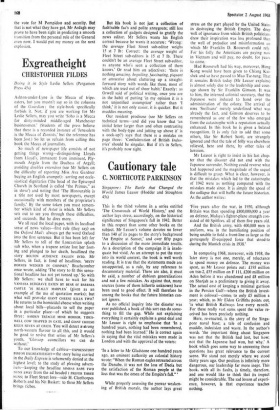The New French Revolution John Ardagh (Seeker and Warburg 84s)
Caught short
JOCK BRUCE-GARDYNE
The end of the fourth French Republic was entirely predictable and widely predicted. The combination of insolvency and a bloody and unsuccessful colonial war was more than the fragile constitutional structure could sustain, particularly with a larger-than-life prima donna waiting in full view in the wings to take over. By contrast the 'events' of May 1968 took everybody, at home and abroad, by surprise. And not leak John Ardagh who, with his pub- lishers, has made a heroic effort to catch up with the times in the preface of his The New French Revolation: 'Suddenly, in May 1968, just a few days before the printed copies were sent to the binders ... the word "revolution" in my title—which .refers to a long-term process_ of economic and social mutation—looked as if it might acquire another, more dramatic significance.' The author goes on to,claim that his book 'may help to show why it is that so much frustration has built up.'
I doubt if this claim is really substantiated. This is a solid and in many ways - attractive product of years of research, and Mr Ardagh shows himself a deeply symPathetic perceptive observer of French culture at what he rightly regardi as a period of fundamental change. Certainly he draws attention to some of the factors which led to the crisis in May the appalling overcrowding and the outmoded teaching methods of the French universities, the resentments of the industrialised labour force in the relatively few large firms at the old-fashioned paternalistic attitudes of manage- ment. But his conclusions are broadly optimistic; his theme is that in recent years the progress of reform has been gathering momentum.
It is not Mr Ardagh's fault that his title has been rendered misleading by events. The book's publication in this country has happened to coincide with the release of Jacques Tati's latest film Playtime, and in a sense M Tati has en- capsulated the message of The New French Revolution. His characters hurry from one giant skyscraper to another, past tourist posters advertising the charms of other lands which show a background of identical glass sky- scrapers, and exchanging meaningless scraps of conversation in franglais. The difference is that M Tati is raising a howl of protest against the universal sameness imposed by the insidious influence of American cultural patterns, whereas Mr Ardagh, notwithstanding his aware- ness of the real dangers this influence represents to many of the most admired traditional aspects of French society—literary, culinary, and haute couture—nevertheless feels that the process is to be accepted, on balance, as an essential element in the modernisation of what is still an old-fashioned country. But then, unlike M Tati, he believes that French culture is sufficiently resilient to survive the new pressures to international conformity and to mould them. I hope he is right : I am not so sure.
The best chapters in The New French Revo- lution are those dealing with the agonisingly slow and difficult process of reforming the education system, the current decay in some fields of the arts (Mr Ardagh has been one of the best-infOrmed foreign students of the French cinema industry since his days as Paris corre- spondent of The Times at the end of the 1950s) and the revitalising of the provinces. The chapters on industry and the economy are somewhat superficial: one feels that Mr Ardagh has found it difficult to penetrate the protective barriers of secrecy which even the leading French firms present to the outside world. It is also disappointing to see that Mr Ardagh falls into the modish error of attributing most of the shortcomings in the social policies of the Fifth Republic to the cost of the force de frappe. But such flaws are more than counter- balanced by a host of well-selected and reveal- ing illustrations of a society in transition, such as the comment of one unnamed Frenchman to an American, `no we don't have pasteurised milk in France, but we do have Pasteur.'
Yet in the end one is still left wandering about the 'events of May.' The explanation, I think, is to be found in the fact that Mr Ardagh —wisely, perhaps, for It is a well-ploughed furrow—has intentionally steered clear of French politics. For, although the most serious aspect of the troubles was the general strike, I suspect that they originated not in the short- comings of the General's efforts to drag his countrymen into the second half of the twentieth century, but in the inescapable pattern of French political history. After six years of grandeur -and stability Frenchmen are bored. and the instinct fOr anarchy is reasserting itself. No doubt the mass of the population wa's horrified by the cracks which suddenly appeared in the ground at its feet, and responded with the vote for M Pompidou and security. But that is not what they have got. Mr Ardagh may prove to have been right in predicting a smooth transition from the personal rule of the General even now. I would put my money on the next explosion.







































 Previous page
Previous page